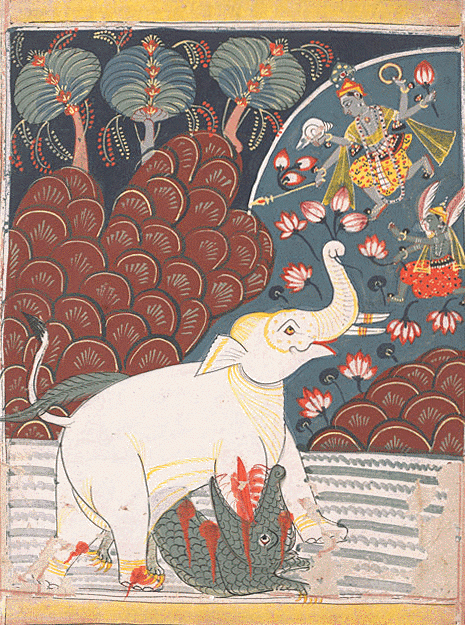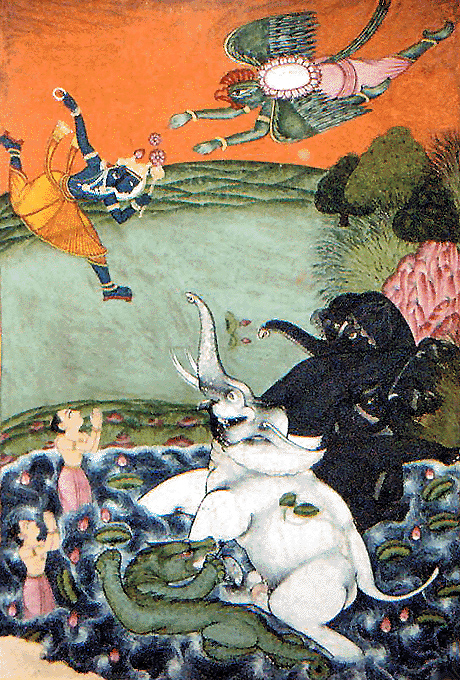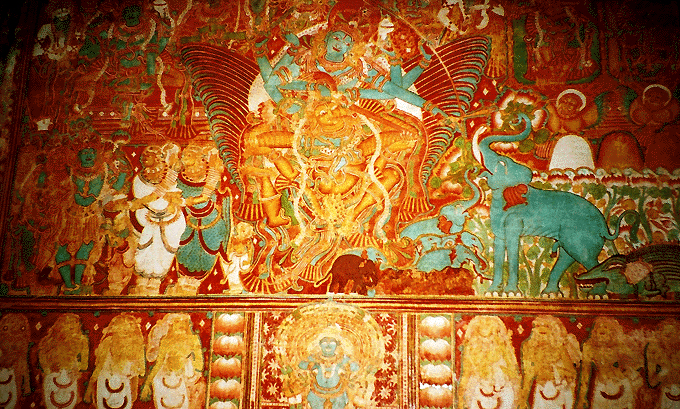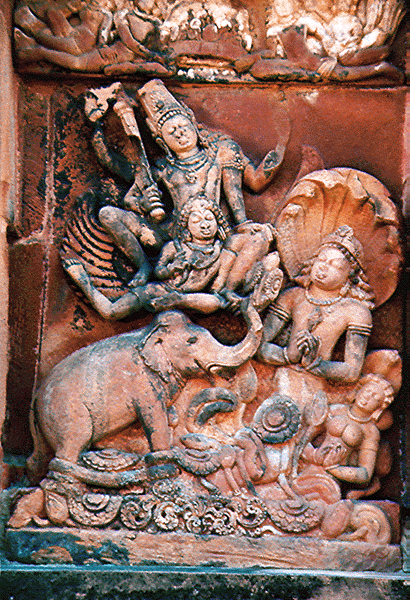
|
|
|
|
BY: SUN STAFF

Vishnu and Garuda Save the King of the Elephants Feb 14, CANADA (SUN) — A serial exploration of the holy sites visited by Lord Caitanya. Gajendra-moksana
During his pilgrimage through the south of India, Lord Caitanya Mahaprabhu visited a famous tirtha at the very southern-most tip of the subcontinent. Nagercoil in Tamil Nadu, approximately 11 km. inland from the south coast, is home to Gajendra-moksana tirtha.
Madhya Lila 9 Summary "Then the Lord went to Setubandha and took His bath at Dhanus-tirtha. He also visited Ramesvara, where He collected some papers connected with Sitadevi, whose illusory form was kidnapped by Ravana. The Lord next visited the places known as Pandya-desa, Tamraparni, Naya-tripadi, Ciyadatala, Tila-kanci, Gajendra-moksana, Panagadi, Camtapura, Sri Vaikuntha, Malaya-parvata and Kanya-kumari. The Lord then met the Bhattatharis at Mallara-desa and saved Kala Krsnadasa from their clutches." The opening sloka of Madhya Lila 9, Text 1, refers to the people of South India, who were converted by the mercy of the Lord away from false philosophies. They are compared to the elephant Gajendra, being bitten by the crocodiles of Mayavada, Buddhist and Jain philosophies: Madhya Lila 9.1
"Lord Sri Caitanya Mahaprabhu converted the inhabitants of South India. These people were as strong as elephants, but they were in the clutches of the crocodiles of various philosophies, such as the Buddhist, Jain and Mayavada philosophies. With His disc of mercy the Lord delivered them all by converting them into Vaisnavas, devotees of the Lord. PURPORT

Later, In Madhya Lila 9.221, Srila Prabhupada provides specifics as to the location of the Gajendra-moksana tirtha visited by Lord Caitanya: Madhya 9.221
"Lord Sri Caitanya Mahaprabhu then visited the holy place named Gajendra-mokshana, where He went to a temple of Lord Vishnu. He then came to Panagadi, a holy place where He saw the Deities of Lord Ramacandra and Sita. PURPORT Panagadi (Pannakudi) is about thirty miles south of Tirunelveli. Formerly the temple there contained the Deity of Sri Ramacandra, but later the devotees of Lord Siva replaced Lord Ramacandra with a deity of Lord Siva named Ramesvara or Rama-linga Siva." While the town of Kaivera is not easily found on the map today, Nagercoil is a well known city. Pannakudi, located about 32 km northwest of Nagercoil, and is also on modern maps. The Bhagavata describes Gajendra-moksha, the Liberation of Gajendra, one of the many inconceivable exploits of Lord Vishnu. A great devotee of Vishnu, King Indradyumna was cursed by the sage Agastya to be reborn as an elephant. The sage's words proved true and Indradyumna was reborn as Gajendra, the king of elephants. One day, as he stepped into a lake to drink his fill, he was caught by a crocodile. Though he fought with all his might to shake it off, the crocodile only tightened its grip. Gajendra remained thus trapped for many years. Finally in great despair, he cried out piteously to the Lord to help him. Hearing his entreaties, Vishnu descended expeditiously on the back of Garuda. Srila Prabhupada describes Gajendra's crisis in his Srimad-Bhagavatam, 8th Canto, Chapter Two summary: "The Second, Third and Fourth Chapters of this canto describe how the Lord, during the reign of the fourth Manu, gave protection to the king of the elephants. As described in this Second Chapter, when the King of the elephants, along with his female elephants, was enjoying in the water, a crocodile suddenly attacked him, and the elephant surrendered to the lotus feet of the Personality of Godhead for protection. In the midst of the ocean of milk, there is a very high and beautiful mountain that has an altitude of ten thousand yojanas, or eighty thousand miles. This mountain is known as Trikuta. In a valley of Trikuta there is a nice garden named Rtumat, which was constructed by Varuna, and in that area there is a very nice lake. Once the chief of the elephants, along with female elephants, went to enjoy bathing in that lake, and they disturbed the inhabitants of the water. Because of this, the chief crocodile in that water, who was very powerful, immediately attacked the elephant's leg. Thus there ensued a great fight between the elephant and the crocodile. This fight continued for one thousand years. Neither the elephant nor the crocodile died, but since they were in the water, the elephant gradually became weak whereas the power of the crocodile increased more and more. Thus the crocodile became more and more encouraged. Then the elephant, being helpless and seeing that there was no other way for his protection, sought shelter at the lotus feet of the Supreme Personality of Godhead."

Gajendra Moksha mural A few hundred kilometers north of Nagercoil, along the west coast of Kerala is the village of Krishnapuram, which is home to an old palace constructed during the reign of King Marthanda Varma, who annexed Kayamkulam to Thiruvithamcode in 1746 AD. Inside the palace is a stunning mural depicting the pastime of Lord Visnu and the elephant Gajendra. This is one of the largest mural panels in Kerala. Beautiful sculptures depicting the Gajendra-moksha theme are found many places in India, most notably at Barhhut, Madhya Pradesh; Deogarh, Uttar Pradesh; and at the three Pattadakkal temples in Karnataka. But nowhere is the Gajendra-moksha pastime more excellently memorialized than in Srimad-Bhagavatam, Canto 8, 3.2-29. Best known by many as the song, 'Om Namo Bhagavate Tasmai', in which Srila Vyasadeva relates the transcendental essence of this pastime.
shri-ganjendra uvacha Gajendra said: I offer my respectful obeisances unto the Supreme Person, Vasudeva [om namo bhagavate vasudevaya]. Because of Him this material body acts due to the presence of spirit, and He is therefore the root cause of everyone. He is worshipable for such exalted persons as Brahma and Shiva, and He has entered the heart of every living being. Let me meditate upon Him. (Srimad-Bhagavatam 8.3.2)
yenedam ya idam svayam yo 'smat parasmach cha paras tam prapadye svayambhuvam The Supreme Godhead is the supreme platform on which everything rests, the ingredient by which everything has been produced, and the person who has created and is the only cause of this cosmic manifestation. Nonetheless, He is different from the cause and the result. I surrender unto Him, the Supreme Personality of Godhead, who is self-sufficient in everything. (8.3.3)
kvachid vibhatam kva cha tat tirohitam aviddha-drik sakshy ubhayam tad ikshate sa atma-mula 'vatu mam parat-paraha The Supreme Personality of Godhead, by expanding His own energy, keeps this cosmic manifestation visible and again sometimes renders it invisible. He is both the supreme cause and the supreme result, the observer and the witness, in all circumstances. Thus He is transcendental to everything. May that Supreme Personality of Godhead give me protection. (8.3.4)
lokeshu paleshu cha sarva-hetushu tamas tadasid gahanam gabhiram yas tasya pare 'bhivirajate vibhuhu In due course of time, when all the causative and effective manifestations of the universe, including the planets and their directors and maintainers, are annihilated, there is a situation of dense darkness. Above this darkness, however, is the Supreme Personality of Godhead, I take shelter of His lotus feet. (8.3.5)
jantuh punah ko 'rhati gantum iritum yatha natasyakritibhir vicheshtato duratyayanukramanah sa mavatu An artist onstage, being covered by attractive dresses and dancing with different movements, is not understood by his audience; similarly, the activities and features of the Supreme Artist cannot be understood even by the demigods or great sages, and certainly not by those who are unintelligent like animals. Neither the demigods and sages nor the unintelligent can understand the features of the Lord, nor can they express in words His actual position. May that Supreme Personality of Godhead give me protection. (8.3.6)
vimukta-sanga munayah susadhavaha charanty aloka-vratam avranam vane bhutatma-bhutah suhridah sa me gatihi Renunciants and great sages who see all living beings equally, who are friendly to everyone and who flawlessly practice in the forest the vows of brahmacarya [celibate student], vanaprastha [retired] and sannyasa [renunciation] desire to see the all-auspicious lotus feet of the Supreme Personality of Godhead. May that same Supreme Personality of Godhead be my destination. (8.3.7)
na nama-rupe guna-dosha eva va tathapi lokapyaya-sambhavaya yaha sva-mayaya tany anukalam ricchati tasmai namah pareshaya brahmane 'nanta-shaktaye arupayoru-rupaya nama ashcarya-karmane The Supreme Personality of Godhead has no material birth, activities, name, form, qualities or faults. To fulfill the purpose for which this material world is created and destroyed, He comes in the form of a human being like Lord Rama or Lord Krishna by His original internal potency. He has immense potency, and in various forms, all free from material contamination, He acts wonderfully. He is therefore the Supreme Brahman. I offer my respects to Him. (8.3.8-9)
sakshine paramatmane namo giram viduraya manasash chetasam api I offer my respectful obeisances unto the Supreme Personality of Godhead, the self-effulgent Supersoul, who is the witness in everyone's heart, who enlightens the individual soul and who cannot be reached by exercises of the mind, words or consciousness. (8.3.10)
naishkarmyena vipashcita namah kaivalya-nathaya nirvana-sukha-samvide The Supreme Personality of Godhead is realized by pure devotees who act in the transcendental existence of bhakti-yoga. He is the bestower of uncontaminated happiness and is the master of the transcendental world. Therefore I offer my respects unto Him. (8.3.11)
mudhaya guna-dharmine nirvisheshaya samyaya namo jnana-ghanaya cha I offer my respectful obeisances to Lord Vasudev, who is all-pervading, to the Lord's fierce form as Lord Nrisimhadeva, to the Lord's form as an animal [Lord Varahadeva], to Lord Dattatreya, who preached impersonalism, to Lord Buddha, and to all the other incarnations. I offer my respectful obeisances unto the Lord, who has no material qualities but who accepts the three qualities of goodness, passion and ignorance within this material world. I also offer my respectful obeisances unto the impersonal Brahman effulgence. (8.3.12)
sarvadhyakshaya sakshine purushayatma-mulaya mula-prakritaye namaha I beg to offer my respectful obeisances unto You, who are the Supersoul, the superintendent of everything, and the witness of all that occurs. You are the Supreme Person, the origin of material nature and of the total material energy. You are also the owner of the material body. Therefore, You are the supreme complete. I offer my respectful obeisances unto You. (8.3.13)
sarva-pratyaya-hetave asata cchayayoktaya sad-abhasaya te namaha My Lord, You are the observer of all the objectives of the senses. Without Your mercy, there is no possibility of solving the problem of doubts. The material world is just like a shadow resembling You. Indeed, one accepts this material world as real because it gives a glimpse of Your existence. (8.3.14)
nishkaranayadbhuta-karanaya sarvagamamnaya-maharnavaya namo 'pavargaya parayanaya My Lord, You are the cause of all causes, but You Yourself have no causes. Therefore You are the wonderful cause of everything. I offer my respectful obeisances unto You, who are the shelter of the Vedic knowledge contained in the shastras like the Pancharatras and Vedanta-sutra, which are Your representations, and who are the source of the parampara system. Because it is You who can give liberation, You are the only shelter for all transcendentalists. Let me offer my respectful obeisances unto You. (8.3.15)
tat-kshobha-visphurjita-manasaya naishkarmya-bhavena vivarjitagama svayam-prakashaya namas karomi My Lord, as the fire in arani wood is covered, You and Your unlimited knowledge are covered by the material modes of nature. Your mind, however, is not attentive to the activities of the modes of nature. Those who are advanced in spiritual knowledge are not subject to the regulative principles directed in the Vedic literature. Because such advanced souls are transcendental, You personally appear in their pure minds. Therefore I offer my respectful obeisances unto You. (8.3.16)
muktaya bhuri-karunaya namo 'layaya svamshena sarva-tanu-bhrin-manasi pratita- pratyag-drishe bhagavate brihate namaste Since an animal such as I has surrendered unto You, who are supremely liberated, certainly You will release me from this dangerous position. Indeed, being extremely merciful, You incessantly try to deliver me. By Your partial feature as Paramatma, You are situated in the hearts of all embodied beings. You are celebrated as direct transcendental knowledge, and You are unlimited. I offer my respectful obeisances unto You, the Supreme Personality of Godhead. (8.3.17)
dushprapanaya guna-sanga-vivarjitaya muktatmabhih sva-hridaya paribhavitaya jnanatmane bhagavate nama ishvaraya My Lord, those who are completely freed from material contamination always meditate upon You within the cores of their hearts. You are extremely difficult to attain for those like me who are too attached to mental concoction, home, relatives, friends, money, servants and assistants. You are the Supreme Personality of Godhead, uncontaminated by the modes of nature. You are the reservoir of all enlightenment, the supreme controller. I therefore offer my respectful obeisances unto You. (8.3.18)
bhajanta ishtam gatim apnuvanti kim chashisho raty api deham avyayam karotu me 'dabhra-dayo vimokshanam After worshiping the Supreme Personality of Godhead, those who are interested in the four principles of religion, economic development, sense gratification and liberation obtain from Him what they desire. What then is to be said of other benedictions? Indeed, sometimes the Lord gives a spiritual body to such ambitious worshipers. May that Supreme Personality of Godhead, who is unlimitedly merciful, bestow upon me the benediction of liberation from this present danger and from the materialistic way of life. (8.3.19)
vanchanti ye vai bhagavat-prapannaha aty-adbhutam tach-charitam sumangalam gayanta ananda-samudra-magnaha tam aksharam brahma param paresham avyaktam adhyatmika-yoga-gamyam atindriyam sukshmam ivatiduram anantam adyam paripurnam ide Unalloyed devotees, who have no desire other than to serve the Lord, worship Him in full surrender and always hear and chant about His activities, which are most wonderful and auspicious. Thus they always merge in an ocean of transcendental bliss. Such devotees never ask the Lord for any benediction. I, however, am in danger. Thus I pray to the Supreme Personality of Godhead, who is eternally existing, who is invisible, who is the Lord of all great personalities, such as Brahma, and who is available only by transcendental bhakti-yoga. Being extremely subtle, He is beyond the reach of my senses and transcendental to all external realization. He is unlimited, He is the original cause, and He is completely full in everything. I offer my obeisances unto Him. (8.3.20-21)
veda lokash characharaha nama-rupa-vibhedena phalgvya cha kalaya kritaha yatharchisho 'gneh savitur gabhastayo niryanti samyanty asakrit sva-rochishaha tatha yato 'yam guna-sampravaho buddhir manah khani sharira-sargaha sa vai na devasura-martya-tiryan na stri na sandho na puman na jantuhu nayam gunah karma na san na casan nishedha-shesho jayatad ashesaha The Supreme Personality of Godhead creates His minor parts and parcels, the jiva-tattva, beginning with Lord Brahma, the demigods and the expansions of Vedic knowledge [Sama, Rig, Yajur and Atharva Vedas] and including all other living entities, moving and nonmoving, with their different names and characteristics. As the sparks of a fire or the shining rays of the sun emanate from their source and merge into it again and again, the mind, the intelligence, the senses, the gross and subtle material bodies, and the continuous transformations of the different modes of nature all emanate from the Lord and again merge into Him. He is neither demigod nor demon, neither human nor bird nor beast. He is not woman, man or neuter, nor is He an animal. He is not a material quality, a fruitive activity, a manifestation or nonmanifestation. He is the last word in the discrimination of "not this, or not that," and He is unlimited. All glories to the Supreme Personality of Godhead. (8.3.22-24)
antar bahish chavritayebha-yonya icchami kalena na yasya viplavas tasyatma-lokavaranasya moksham I do not wish to live anymore after I am released from the attack of the crocodile. What is the use of an elephant's body covered externally and internally by ignorance? I simply desire eternal liberation from the covering of ignorance. That covering is not destroyed by the influence of time. (8.3.25)
avishvan vishva-vedasam vishvatmanam ajam brahma pranato 'smi param padam Now, fully desiring release from material life, I offer my respectful obeisances unto that Supreme Person who is the creator of the universe, who is Himself the form of the universe and who is nonetheless transcendental to this cosmic manifestation. He is the supreme knower of everything in this world, the Supersoul of the universe. He is the unborn, supremely situated Lord. I offer my respectful obeisances unto Him. (8.3.26)
hridi yoga-vibhavite yogino yam prapashyanti yogesham tam nato 'smy aham I offer my respectful obeisances unto the Supreme, the Supersoul, the master of all mystic yoga, who is seen in the core of the heart by perfect mystics when they are completely purified and freed from the reactions of fruitive activity by practicing bhakti-yoga. (8.3.27)
shakti-trayayakhila-dhi-gunaya prapanna-palaya duranta-shaktaye kad-indriyanam anavapya-vartmane My Lord, You are the controller of formidable strength in three kinds of energy. You appear as the reservoir of all sense pleasure and the protector of the surrendered souls. You possess unlimited energy, but You are unapproachable by those who are unable to control their senses. I offer my respectful obeisances unto You again and again. (8.3.28)
yach-chaktyaham-dhiya hatam tam duratyaya-mahatmyam bhagavantam ito 'smy aham I offer my respectful obeisances unto the Supreme Personality of Godhead, by whose illusory energy the jiva [individual spirit soul], who is part and parcel of God, forgets his real identity because of the bodily concept of life. I take shelter of the Supreme Personality of Godhead, whose glories are difficult to understand. (8.3.29)
ye mam stuvanty anenanga pratibudhya nishatyaye tesham pranatyaye chaham dadami vipulam gatim "My dear devotee, unto those who rise from bed at the end of night and offer Me the prayers offered by you, I give an eternal residence in the spiritual world at the end of their lives." (8.4.25)

| |